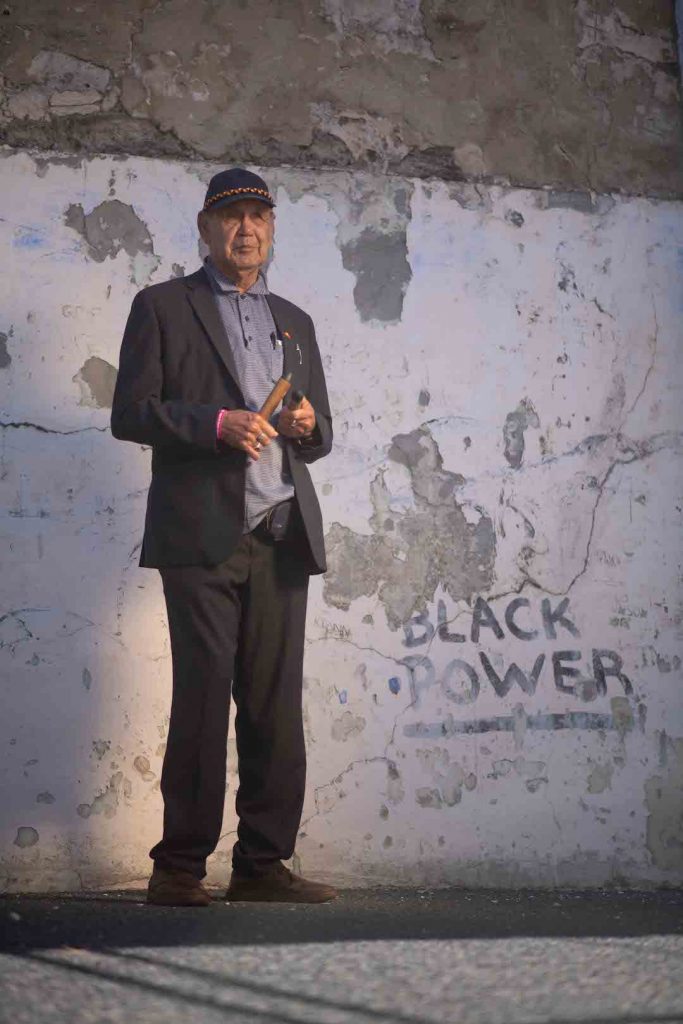Aboriginal singer-songwriter Phil Walley-Stack recorded his final conversation with his grandmother, Aunty Theresa Walley, just days before her death.
Phil says it was a great privilege to be able to preserve the conversation for posterity.
“It’s a beautiful moment of us being together,” he says.
It is one of nine conversations Phil has recorded with Noongar Elders living in Perth, or Boorloo as it is known in Noongar, for the series of podcasts.
Another two of the elders have died since Phil recorded conversations with them.
“Hearing when they’ve passed away there is a blessed feeling knowing that I got to sit with them and listen to their story,” Phil says.
“Yes, they were being documented and recorded, but the interviews felt like me on a personal journey learning more about our people.”
Phil recorded his conversations as part of the Ni! Means Listen Podcast and includes the stories of Albert McNamara, Ben Taylor Cuiermara, Doolann Leisha Eatts, Farley Garlett, Irene McNamara, Margaret Culbong, Muriel Bowie, Noel Nannup, Theresa Walley, and Walter Eatts.
Phil, a Noongar man raised in country WA around Northam and Wyalkatchem grew up around lots of elders so was comfortable recording his conversations with them to provide some perspective on their life experiences.
“I learned how to walk on country and care for country, about my identity and culture back in the 80s before it was taught in schools.
“I had a blessed childhood, I’m thankful for the childhood I had and the people who were around me.”
Phil took to performing early on and has become an accomplished performing artist, musician, dancer and author.
His ambition was to travel the world and share Aboriginal culture.
“I’ve been interested in our culture and loved our culture since I was a little fella.
“Since I was five years old, I was put in the dance troupes, painted up and performed our culture. It was natural to me. It wasn’t anything that I had to chase or be forced into but growing up with my elders around it was always easy for me to communicate and have a yarn with our old people.”
Putting the podcasts together was an emotional roller coaster for Phil.
“There were a lot of laughs the old people wanted to do, they didn’t hold a lot of grudges for the hardships they’ve been through, they were just focusing on a better life for our young people coming through today.
“A lot of our elders get into a bit of a routine when they talk about their life stories because they’ve been interviewed over and over and no one has really had a conversation with them on record.
“To break it down and have a conversation with them meant we could go deeper into memories and feelings.”
Phil says many people are surprised by how many Aboriginal people are still around with similar upbringings who went through the same heartache and nightmares of the Stolen Generation.
It’s a tragedy that’s still in our recent past.

“We still have people today, younger people than our elders who weren’t allowed in towns after six o’clock and there was still that segregation and that was only 50 to 60 years ago.
“I remember during my apprenticeship when I had just turned 18, there were a few country pubs that we went to where we weren’t allowed in the front bar, we had to go the back bar, and that’s just me and I’m 42 this year and still experiencing segregation.”
Phil would like to do more of the podcasts because he believes Aboriginal people telling their stories in their way with their voice, is important.
“If you look back through Aboriginal history it’s always been documented by a white person, so it’s interpreted from a white person’s perspective.
“What I love with this project is that it’s the elder’s voice that is being recorded and there’s no questions, so you don’t have to go back through all these different files and documents and piece together this puzzle of somebody’s history.
“This is the elders history being told from them firsthand so you look down the track 50 years’ time or 100 years’ time and their great-great-great-grandchildren will be listening to these recordings and hearing their story firsthand.”
While the podcasts are a great way of preserving Aboriginal histories Phil hopes all Australians can use the podcasts to take ownership of the history.
“It’s the history of this place where we’re living, it’s not just blackfella history or whitefella history, it’s Australian history and these stories need to be told and listened to with an open heart, so that we don’t do these things again.”
He wants people to listen to the podcasts and soak up the stories they tell.
“Don’t judge or try and justify what happened in the past, just listen to a person telling their story and how they felt.”
The podcasts can be found at www.can.org.au/community/ngaluk-waan gkiny/ni-listen-podcast.